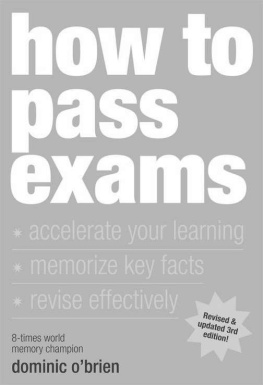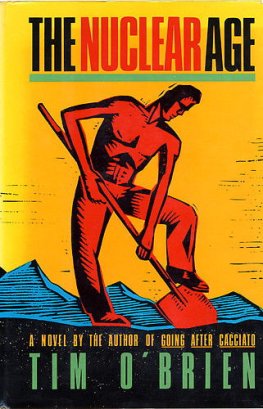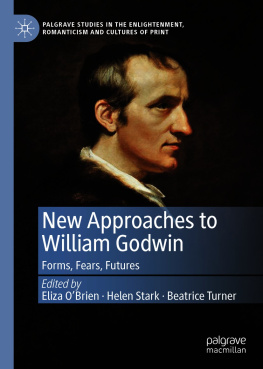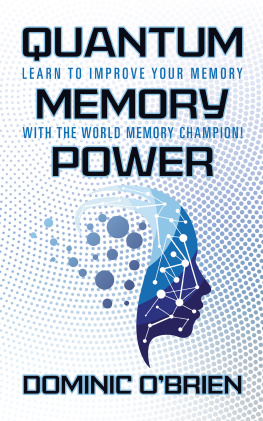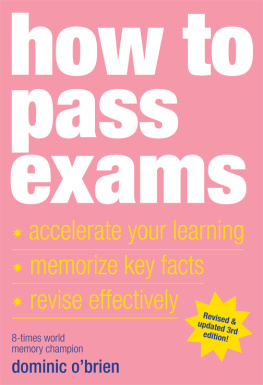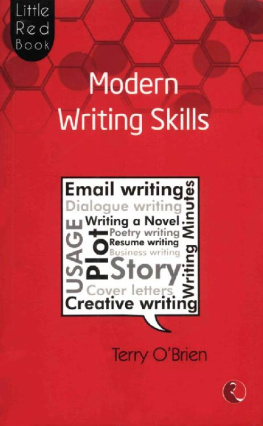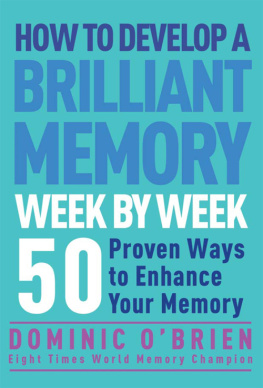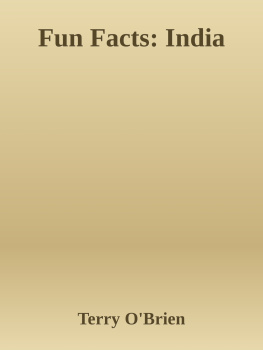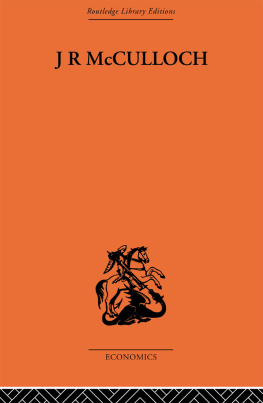Dominic O’Brien [O’Brien - How to Pass Exams
Here you can read online Dominic O’Brien [O’Brien - How to Pass Exams full text of the book (entire story) in english for free. Download pdf and epub, get meaning, cover and reviews about this ebook. year: 2013, publisher: Watkins Media, genre: Science. Description of the work, (preface) as well as reviews are available. Best literature library LitArk.com created for fans of good reading and offers a wide selection of genres:
Romance novel
Science fiction
Adventure
Detective
Science
History
Home and family
Prose
Art
Politics
Computer
Non-fiction
Religion
Business
Children
Humor
Choose a favorite category and find really read worthwhile books. Enjoy immersion in the world of imagination, feel the emotions of the characters or learn something new for yourself, make an fascinating discovery.
- Book:How to Pass Exams
- Author:
- Publisher:Watkins Media
- Genre:
- Year:2013
- Rating:4 / 5
- Favourites:Add to favourites
- Your mark:
- 80
- 1
- 2
- 3
- 4
- 5
How to Pass Exams: summary, description and annotation
We offer to read an annotation, description, summary or preface (depends on what the author of the book "How to Pass Exams" wrote himself). If you haven't found the necessary information about the book — write in the comments, we will try to find it.
Dominic O’Brien [O’Brien: author's other books
Who wrote How to Pass Exams? Find out the surname, the name of the author of the book and a list of all author's works by series.
How to Pass Exams — read online for free the complete book (whole text) full work
Below is the text of the book, divided by pages. System saving the place of the last page read, allows you to conveniently read the book "How to Pass Exams" online for free, without having to search again every time where you left off. Put a bookmark, and you can go to the page where you finished reading at any time.
Font size:
Interval:
Bookmark:
Foreword
Dominic OBrien has now become globally known for his extraordinary mental powers. I had the privilege of first meeting Dominic in the late 1980s when I was in the process of organising the inaugural World Memory Championships. He told me that, like many students, he had been criticised in school for inattentiveness, daydreaming and for not being as interested as he should have been in the topics in the standard curriculum. Dominics interests were more involved in the worlds of the imagination, music and developing his more general mental skills. As a result, he left school and began to study the art of memory.
Within five short years he had developed a gigantic Memory Muscle and was ready to challenge all comers at the first World Memory Championships in 1991. Taking on such legends of the mind as Creighton Carvello, who had set the world record for memorisation of the numbers of pi at 20,013 digits, Dominic virtually cruised to victory, clinching the title of first World Memory Champion and in the process breaking and setting mental world records.
Since then he has gone on to defend his title successfully and to establish a growing number of mental records, including the memorisation of a pack of cards in under forty-five seconds. Ranked No. 1 in the world in Buzans Book of Genius (published 1994), Dominic is universally recognised as one of the greatest mental athletes in the world. After having seen Dominic smash world records with apparent ease in 1993 and 1994, Grandmaster Raymond Keene O.B.E., an authority on mind sports and chess, and chess correspondent of The Times and the Spectator, said that he had never seen anything so dominantly brilliant in the field of mental athletics.
What is more important for all students to realise is that Dominic achieved his extraordinary accomplishments by studying the field, by applying himself totally to the task he had set himself and by developing the natural skills which we all have.
In this excellent book on how to pass exams which you are about to read, Dominic reveals the methods and secrets by which he has achieved such enviable success. I recommend this book with delight, in the belief that all students will benefit from its clear advice, and look forward to seeing you challenge Dominic at the next World Memory Championships!
TONY BUZAN
Contents
1 Introduction
LEARNING HOW TO LEARN
Some years ago I watched an event that was to change my life. Creighton Carvello, a psychiatric nurse from Middlesbrough in the northeast of England, memorised the order of a pack of playing cards in just under three minutes. In doing so he achieved a new world memory record. So astonished and bewildered was I by this incredible feat of brain power that I began to investigate my own memory.
The burning question to me was whether Creighton possessed extraordinary powers of recall, or was privy to special techniques that could be used by the rest of us to train our own brains, producing equally stunning results.
After many years of intensive study in memory training, I am utterly convinced that most of us are quite capable of storing in our brain not just the order of a pack of fifty-two playing cards, but information in encyclopaedic quantities. The only thing preventing us from doing so is ignorance of the techniques and systems that would enable us to unleash the full potential of this remarkable resource the brain which for most of the time lies unused within our skulls.
The key to memory development, accelerated learning and, ultimately, the passing of exams lies in our imagination. This book will show you how to unlock your own imagination by treating it like a muscle, and giving it regular exercise as it takes adventurous walks through familiar locations. You will discover how dull, unintelligible data can be converted into meaningful, memorable images by learning the colourful language of numbers. I will show you how historical dates, chemical symbols, foreign words and lines from literature can all be stored using three-dimensional mental filing systems. I will demonstrate how success can be achieved in academic disciplines as diverse as maths and media studies by simply using your memory to its maximum natural potential. By bringing the full capability of your memory into play and combining it with the most effective reading and revising techniques both of which this book will show you you will be well on the way to passing your exams with flying colours. No matter what your level of study GCSE, A-Level, baccalaureate, B-Tec or Degree if your course involves exams, your first steps to success lie here.
What a pity I wasnt shown these methods when I was at school, struggling away.
Belief and confidence
The root of my problems at school lay in a common, and misguided, belief. The belief that everyone falls into one of two camps that a child is born either with or without the gift of learning. Born to be scholarly or not. In short bright or dim.
According to this belief, if you are unlucky enough to fall into the latter group, then you are destined to struggle and ultimately fail. At school I knew my place. I accepted my category. Just imagine what that did for my confidence!
What appeared to be a lack of concentration in class was in fact day-dreaming one talent I did possess was an active imagination. What a tragedy this wasnt nurtured from an early age. For imagination, as you will discover, is the key to developing a perfect memory.
Learning how to learn
I hope your educational experiences havent been as bad as mine were I hated school. I accepted, reluctantly, that this was the way things were, but couldnt understand why I should be restricted to a watered-down, grey, overcomplicated, artificial, classroom version of the universe, when outside I could see life itself beckoning in all its three-dimensional glory.
OBrien! Why are you staring out of the window? Stop day-dreaming and concentrate! So the trick was to lock eyes on the teacher and day-dream at the same time.
OBrien, what have I just been talking about? Cant you remember anything? Is nothing absorbed in that head of yours?
Precious little information was absorbed in those days because no one explained the absorption process. Buy a washing machine and the instructions come with it. Purchase a computer and you get a users guide of encyclopaedic proportions. Your brain is vastly superior to any computer and incredibly complicated. So when we are born, wheres the instruction manual? Much like using a computer, how could I be expected to output information if I wasnt told how to input it in the first place?
It is now my firm belief that what every student really needs to know before tackling any subject is how to learn how to learn. This book aims to reveal that process, so treat this as your own users guide to the brain.
2Speed Reading
The art of reading is to skip judiciously.
P. G. Hamerton (183494)
WHAT HOLDS UP OUR READING SPEED ?
We know that the human eye can switch focus in less than 1/500 of a second. The width of text that each eye, at a normal reading distance of 45 centimetres (18 inches), can focus upon is approximately eighteen letters in an average typeface, such as the one in which this book is set. Thats about three words, on average. In theory, therefore, the human eye should be capable of reading 1,500 words per second or 90,000 words per minute; yet the average reading speed is about 200 words per minute.
So what on earth happened to the other 89,800 words per minute?
Perhaps they got lost when we were taught to read aloud with our tongues instead of our eyes and brains.
The average reading speed, as I have said, lies somewhere between 200 and 250 words per minute, with a comprehension rate (understanding of the text) of between 50 and 70 per cent. Before we look at ways of how you can dramatically increase your reading speed, first test yourself to estimate your reading rate.
Next pageFont size:
Interval:
Bookmark:
Similar books «How to Pass Exams»
Look at similar books to How to Pass Exams. We have selected literature similar in name and meaning in the hope of providing readers with more options to find new, interesting, not yet read works.
Discussion, reviews of the book How to Pass Exams and just readers' own opinions. Leave your comments, write what you think about the work, its meaning or the main characters. Specify what exactly you liked and what you didn't like, and why you think so.

